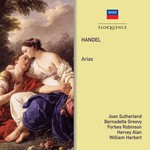
Handel: Arias
 $30.00
Low Stock
add to cart
$30.00
Low Stock
add to cart
GEORG FRIDERIC HANDEL
Handel: Arias
Bernadette Greevy (contralto), Joan Sutherland (soprano), William Herbert (tenor), Hervey Alan (bass), Forbes Robinson (bass)
[ Decca Australian Eloquence / 2 CD ]
Release Date: Sunday 10 December 2017
Should this item be out of stock at the time of your order, we would expect to be able to supply it to you within 2 - 4 weeks.
A newly compiled anthology of Decca recordings on Eloquence surveys the healthy state of Handel singing in England in the 1960s, before this music became the preserve of musicians and singers within the period-instrument movement.
This generous (145-minute) collection is based around a pair of newly re-mastered recital albums made by the contralto Bernadette Greevy and the bass Forbes Robinson. Greevy was a true contralto in the tradition of Kathleen Ferrier, Helen Watts, Janet Baker and Norma Procter. Her 1965-56 recital was drawn from a wide range of Handel's Italian operas (Ottone, Partenope, Alcina, Admeto, Rodelinda, Rinaldo, Atalanta), and it displayed the richness of her voice to fullest advantage, as well as formidable vocal technique and excellent Italian diction. Robinson's 1966 recital represents a wide spectrum of the composer's music in opera, ode, masque and oratorio from 1719 through the 1740s, including familiar favourites ('O ruddier than the cherry' in Acis and Galatea) alongside much rarer delights such as 'Si, tra i ceppi' from the early Berenice.
Decca led the way in the Handel revival of the 1950s. A trail-blazing Messiah, conducted by Sir Adrian Boult, presented the oratorio in an authentic version with up-to-date scholarship. It was followed by Sosarme and Semele on the label's early-music imprint, L'Oiseau-Lyre. The very first L'Oiseau-Lyre stereo LP was 'Music of Handel', issued in January 1959 and excerpted here. It featured two well-established singers, the Australian tenor William Herbert and the British bass Hervey Alan. There was also the newcomer from Australia, Joan Sutherland: the two Handel arias from Alcina she recorded for L'Oiseau-Lyre was her very first recording for the Decca group. Some of her freshest singing dates from her early years, with the 1958 and 1959 Handel performances representing her vocal art at its purest.
The compilation is completed with Sutherland in full flight, excerpted from the 1964 Giulio Cesare and the two albums that made her name, 'The Art of the Prima Donna' (1960) and 'The Art of Bel Canto' (1964).
"An earlier generation of superb Handelians, led by Joan Sutherland, Bernadette Greevy's opulent contralto, William Herbert's textured tenor and the refulgent basses of Hervey Alan and Forbes Robinson." BBC Music
Tracks:
Ottone, Re di Germania - Vieni O Figlio
Partenope / Act 1 - Voglio dire
Alexander Balus - Convey Me To Some Peaceful Shore
Alcina / Act 2 - Verdi prati, selve amene
Ottone, Re di Germania - La speranza e giunta
Admeto / Act 1 - Cangio d'aspetto (How changed the vision)
Rodelinda, HWV 34 / Act 1 - "Dove sei, amato bene?"
Rinaldo, HWV 7a / Act 2 - "Lascia ch'io pianga"
Atalanta / Act 1 - Care selve
Cantata: Clori, Tirsi e Fileno 'Cor fedele' Dramatic Cantata, HMV96 (1707) - La Rondinella
Bernadette Greevy (contralto)
Alcina, HWV 34 / Act 1 - Tornami a vagheggiar
Alcina, HWV 34 / Act 2 - "Ah! Ruggiero crudel - Ombre pallide"
Giulio Cesare / Act 2 - "V'adoro, pupille"
Giulio Cesare / Act 3 - Da tempeste il legno infranto
Samson HWV 57 / Act 2 - With plaintive note
Samson HWV 57 / Act 3 - "Let The Bright Seraphim"
Dame Joan Sutherland (soprano)
Esther, HWV 50 / Scene 2 - "Tune Your Harps To Cheerful Strains"
William Herbert (tenor)
Esther, HWV 50 / Scene 6 - "Turn Not, O Queen, Thy Face Away"
Hervey Alan (bass)
plus Handel Arias featuring Forbes Robinson (bass)
![The Great Placido Domingo [3 CD set] cover](https://images.marbecks.co.nz/_thumbnails/10112/10112737.jpg)


